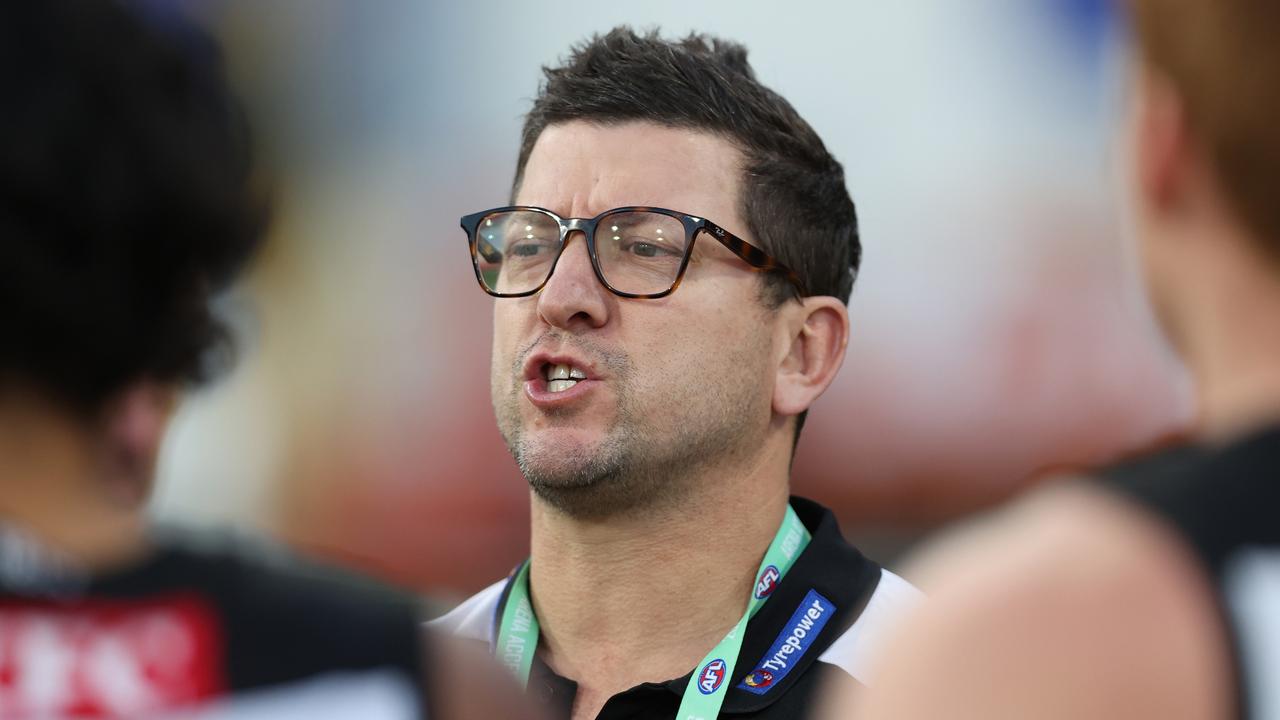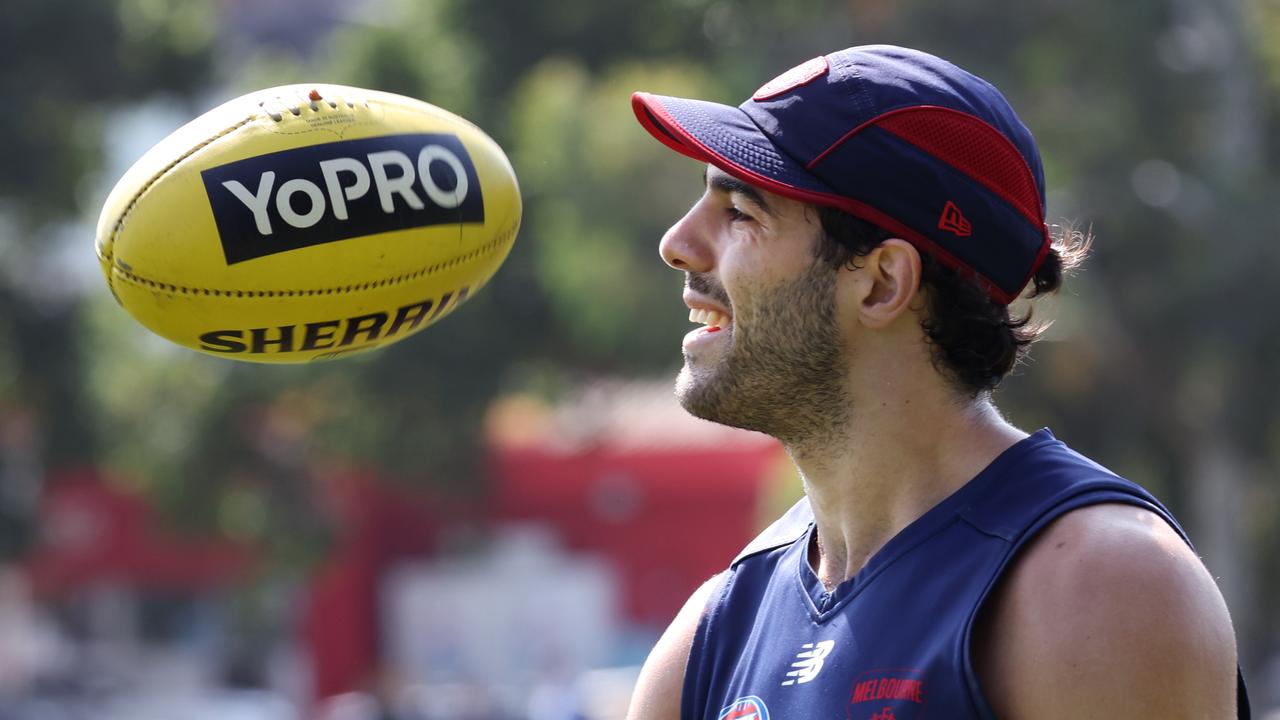AFL 2022: League to introduce a four-person field umpiring system
In the most significant change to umpiring ranks in almost 30 years, the AFL will trial a radical new system to ensure better decision-making by those officiating the game.
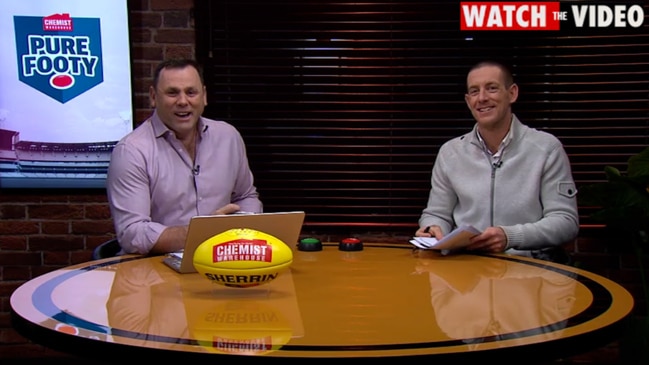
AFL News
Don't miss out on the headlines from AFL News. Followed categories will be added to My News.
The AFL will introduce a four-person field umpiring system at the elite men’s level next year in an effort to reduce the physical toll on umpires and make for better decision-making.
It is understood the AFL’s panel of umpires were told of the move earlier this week.
They had been aware of the likely change, having been a part of a trial of the system last pre-season.
It is the most significant change to officiating the game since the AFL brought in the three-umpire system in 1994, and would likely have come in earlier without the Covid disruptions.
Watch every blockbuster AFL match this weekend Live & Ad-Break Free In-Play on Kayo. New to Kayo? Start your free trial now >
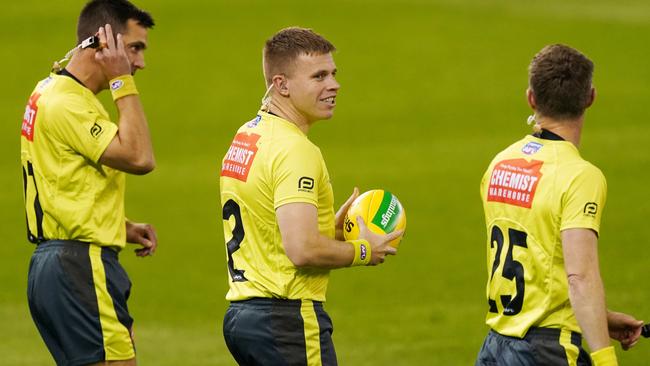
AFL Executive General Manager of Football Andrew Dillon said the “speed and demands of the game” had been a key factor in the plan to introduce an extra umpire to the field of play.
“Australian football is played on the largest field of play with the most players when compared to other field/court sports and has the least number of officials,” Dillon said.
“The game has evolved, and the officiating should evolve with it, with the end goal to deliver better decision making due to less fatigue, better positioning on the ground and ultimately having the best decision-makers remaining in the game for longer and providing more opportunities overall for umpires.
“The AFL has conducted extensive research and trials on the future introduction of a four field umpire system for the AFL competition, all to be supported by additional investment and increase to the AFL umpire list size.”
The investment could cost the AFL up to $1.5 million on extra wages as the total umpires panel goes from 34 to 42.
But the AFL believes the addition of an extra on-field official — instead of an emergency umpire — would mean the best umpires remain in the game for longer.
They also maintain it would attract more talent and greater diversity to the AFL umpiring panel.
The clubs caught attempting to bend Covid rules
The AFL has hit five clubs including Sydney, Richmond and Collingwood with fines for significant Covid testing failures including sending duplicate photos as evidence of negative rapid tests.
The league has hit clubs hard, with Brisbane and St Kilda also handed $25,000 suspended fines.
Sydney will have to accept $50,000 of their $100,000 fine in their football department cap as the AFL cracked down on clubs for breaches of league protocols.
Collingwood has had $25,000 of its $50,000 fine suspended and Richmond has been fined $25,000 ($12,500 suspended) with both clubs forced to pay those fines out of their football department cap.
Breaches include players not undertaking rapid tests at all, not uploading proof of negative tests in time, or uploading duplicate photos of previous tests.
The league says no club gained a competitive advantage from the missed or late tests.
It does not have suspicions of systematic cheating by any clubs to attempt to disguise Covid positive players.
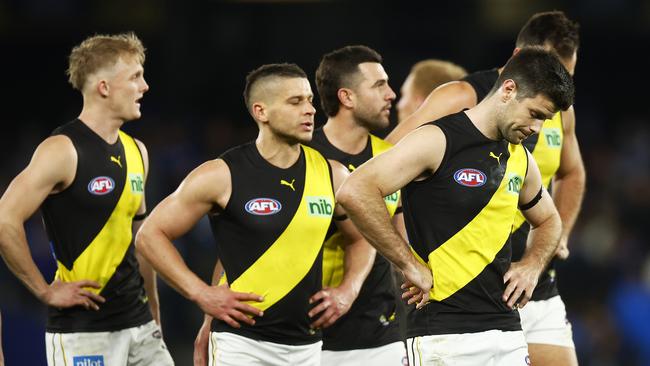
But there are concerns symptomatic players may have not tested to avoid a positive result that would have forced them to miss a game.
Both Richmond and Collingwood have already been fined by the AFL for previous Covid branches including Nathan Buckley’s unauthorised tennis match and Richmond pair Sydney Stack and Callum Coleman-Jones’ involvement in a drunken kebab-shop fight.
Richmond had to pay $100,000 in its football department cap after failing to have Stack and Coleman-Jones pay their part of the fine.
As part of the AFL’s testing procedures all players and coaches are required to provide evidence of a negative rapid test at least twice a week and upload it onto a website within a specific window of time.
Clubs believe many of the issues uncovered were simply through players not taking the time to source the correct photo of their negative test.
Other players and coaches are understood to have uploaded their negative tests just outside of the permitted time limit.
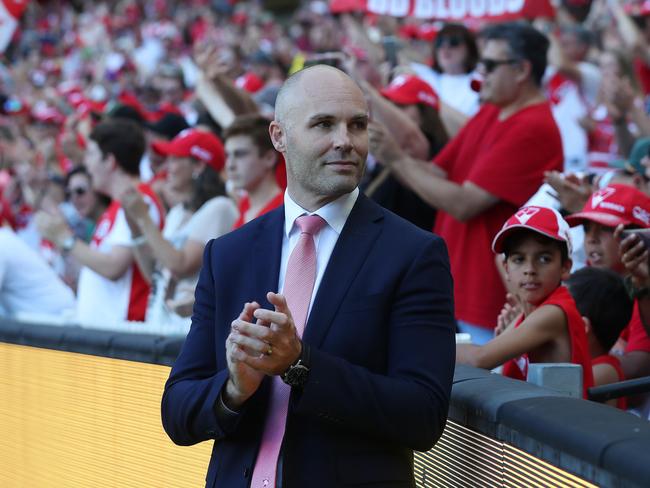
The Swans’ $50,000 hit to their football department cap is significant even as the AFL lifts the limit by $500,000 in the coming years.
Sydney is one of the clubs that has lobbied the hardest for the AFL to lift that football department cap so it can spend more on welfare and mental health.
The AFL now believes that with the winter peak of Covid passing clubs will be well placed to dodge high exposure for players throughout the finals.
But the league has made clear it is up to clubs to ensure their players are not in high-risk environments like nightclubs and bars through finals given they could miss crucial September clashes.
AFL general counsel Andrew Dillon said the clubs had not complied with the Covid rules but said no one had gained a competitive advantage.
“We established a framework in 2022 for clubs to take more responsibility in managing their own people in relation to regular Covid testing. While 13 of the clubs complied with the requirements, the five clubs failed to comply as required and the sanctions they have been handed reflect the seriousness that we take in relation to the health and safety of players, staff and the wider community,” he said.
“Collectively we have worked together as an industry to navigate through the pandemic and no one in our system is above adhering to the protocols and protecting the health and wellbeing of their fellow workmates and the wider community.
“All clubs have since been issued a reminder about their obligations under the rules.”
Sydney chief executive Tom Harley said he wanted to apologise to the AFL and broader community for the mistakes.
“This behaviour falls well short of the standards we expect, and we have ensured the importance of this process is now well understood and complied with across the entire football club,” he said.
Interstate powers throw weight behind Tassie bid
Adelaide and Brisbane have thrown their weight behind Tasmania’s historic bid for a 19th licence as the AFL Commission met on Monday to review the business case for a new side.
Former South Australian premier John Olsen told the Herald Sun the Crows board had already made a preliminary decision to approve a 19th side if that business case stood up.
AFL chief executive Gillon McLachlan has made clear inside AFL House that he believes the bid will get the go-ahead despite the clear lack of government funding for a stadium deal.
The Commission met for eight hours on Monday and while they were given an update on the licence there is more work to be done ahead of a forthcoming president’s meeting.
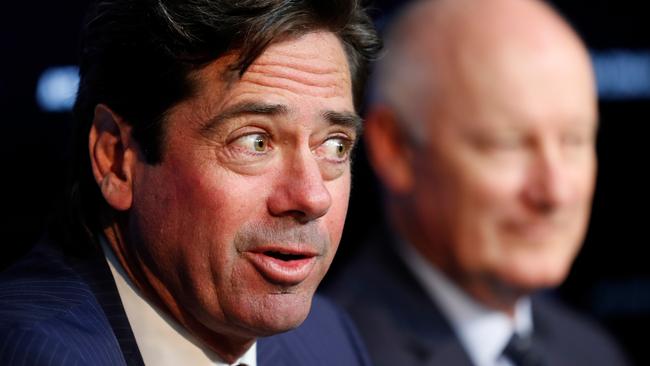
AFL presidents are now expected to meet in person in the last week of August or the first week of September to come to a consensus decision on approving the licence.
Brisbane also made clear on Monday it supported the bid along with clubs including Richmond, North Melbourne and the Western Bulldogs.
There is also a view that clubs including Gold Coast could support the licence if it does not disadvantage football in their respective states despite the strong views of their presidents.
While the stadium deal is a clear worry for the Tasmanian task force and state government, the league believes it can fund the existing team and tick off the 11 “workstreams” it has been working on for months.
Those workstreams are based on topics like the list build, team finances, memberships, governance, player retention, high performance, coaching, talent pathways and the local competition.
The AFL expects to present a detailed information pack to presidents in coming weeks that will outline the business case for Tasmania and the league’s plans to fund the investment.
Adelaide was seen as one of the on-the-fence clubs which might join Collingwood, Hawthorn, Gold Coast and Sydney in expressing grave fears about the league’s capacity to fund the licence.
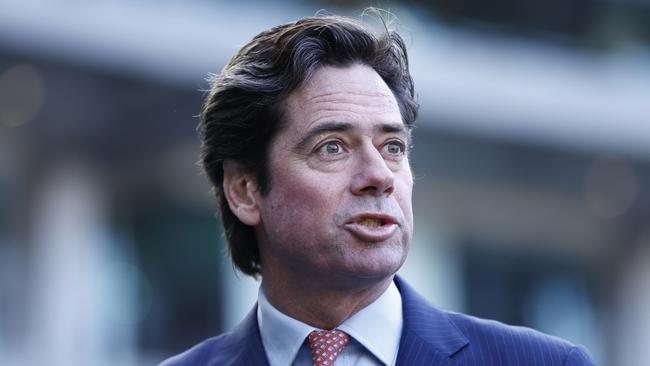
But Olsen revealed to the Herald Sun on Monday the licence had a preliminary green light from the Adelaide board.
“Our board has had a preliminary discussion in relation to it and we are predisposed to a traditional football state having a licence. We want to see the business case but we are predisposed to supporting Tasmania.
“It is a traditional football state and if we are national competition the state in its own right ought to have a team. We have made huge inroads in the eastern seaboard and put in substantial funding over the past couple of decades and in doing so we shouldn’t forget the states which have been traditional Aussie rules football states.
“State and federal governments are substantially contributing to upgraded stadiums worldwide and you only have to look at WA and South Australia to look at the net positive impact for the code. I have no doubt should Tasmania undertake a major refurbishment of a stadium or put in place a new stadium they would be amazed by the benefit that flows.”
Colin Carter’s Tasmanian report made clear the increased TV revenue from 11 new games would help fund the annual distributions to a Tasmanian team even though he used a more conservative estimate than Tasmanian task force numbers.
The ‘serious issues’ putting Tassie bid in jeopardy
The AFL faces a herculean task to convince its club presidents to approve a 19th licence as decisions on Tasmania, TV rights and Gillon McLachlan’s replacement come to a head in August.
The AFL Commission is due to meet on Monday as the Tasmanian licence reaches a critical stage with the 11 ‘workstreams’ all but complete, yet no stadium deal in place.
News Corp understands the AFL Commission will have a considered discussion on the Tasmanian bid and also be updated on the TV rights deal and the search for the next chief executive.
A detailed information pack on the Tassie bid will be sent to all 18 club presidents.
They will be given time for their club boards to assess the information before those presidents meet in one room to make a consensus decision by the end of August.
But one club president estimated on Thursday, six or seven presidents are “violently opposed” to the notion of a 19th club.
Sydney’s Andrew Pridham, Hawthorn’s Jeff Kennett, Gold Coast’s Tony Cochrane and Collingwood’s Jeff Browne are believed to have been joined by more presidents who have not been sold on the need for a 19th team.
Those presidents have serious issues with the lack of a stadium deal, the capacity for a different state government to withdraw funding, and the long list of rival priorities.
They include the need for a concussion compensation fund, investment in community football and a serious study into ACL tears in AFLW players after yet more injuries across the pre-season.
But the AFL believes it can deliver on those 11 workstreams with a compromise position likely on the stadium build despite the state government not yet committing to a new multipurpose covered-roof facility.
The league could make it a provision of the 19th licence that the stadium funding be set by a certain date in the future with sod to be turned by the time of the team’s first game.
The AFL will also make clear to those presidents the value of the extra 11 games in the broadcast deal, which could effectively fund the league’s annual special distribution.
The current broadcast rights deal is worth $473 million per season for 198 home-and-away games and nine finals, which values each game at nearly $2 million.
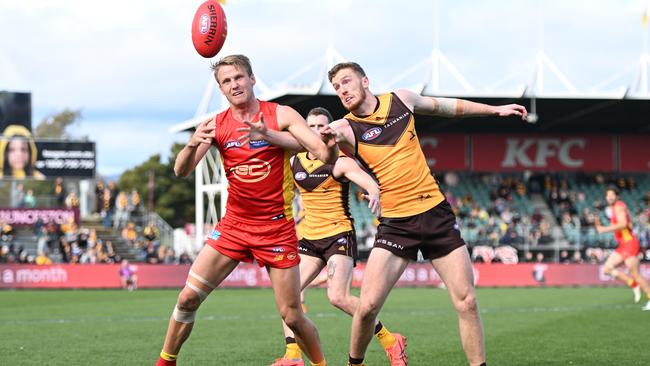
Hawthorn president Jeff Kennett told News Corp last week the AFL had to deliver a timeline for a decision so it could be made by the end of August.
“Time to deliver has arrived. We have asked for a date for the meeting and there is no paperwork yet. It can’t be pushed back. It has to be resolved by August because that’s what the AFL have publicly said. It will be paperwork from the Tasmanian government and the AFL and we will take it to our (club) boards and come back and make a decision.”
McLachlan’s successor will be faced with the difficult task of landing the execution of the Tasmanian team if it is ticked off, with the league still believing the presidents can be won over.
AFL executives Andrew Dillon and Travis Auld are still seen as the best-placed contenders to replace McLachlan after months of headhunting and interviews.
Western Bulldogs president Kyle Watson-Wheeler has not been involved in the process and has not pursued the role as she continues as the managing director of Disney Australia and New Zealand.
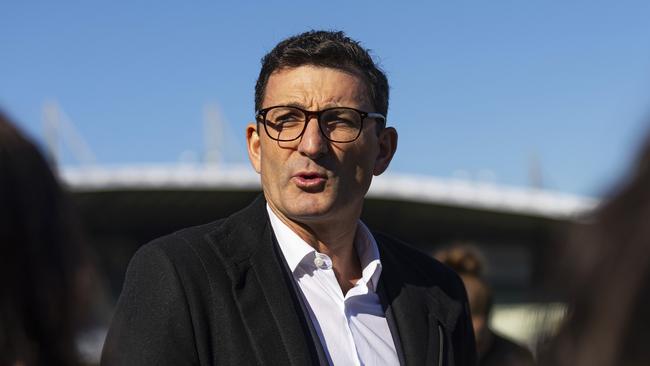
News Corp reported in April that Dillon was the dark horse who could overtake more fancied candidates given the strong support he has from AFL commissioners and his work across the league’s football, legal and integrity fields.
McLachlan must also close a deal on the TV rights from 2025 onwards, with Fox Footy and Seven still in the strongest position to secure that deal.
The Paramount/Ten and Nine/Stan bids could yet secure one or more games per round but after months of talks the incumbents remain in a strong position to continue their longstanding relationship.
Fox Footy was able to secure full streaming rights through Kayo in the last round of broadcast rights but this time around is determined to secure the right to provide its own commentators for all nine games.
It is also seeking more exclusive games including a Super Saturday with five games after the success of a similar model in the NRL.
More Coverage
Originally published as AFL 2022: League to introduce a four-person field umpiring system



